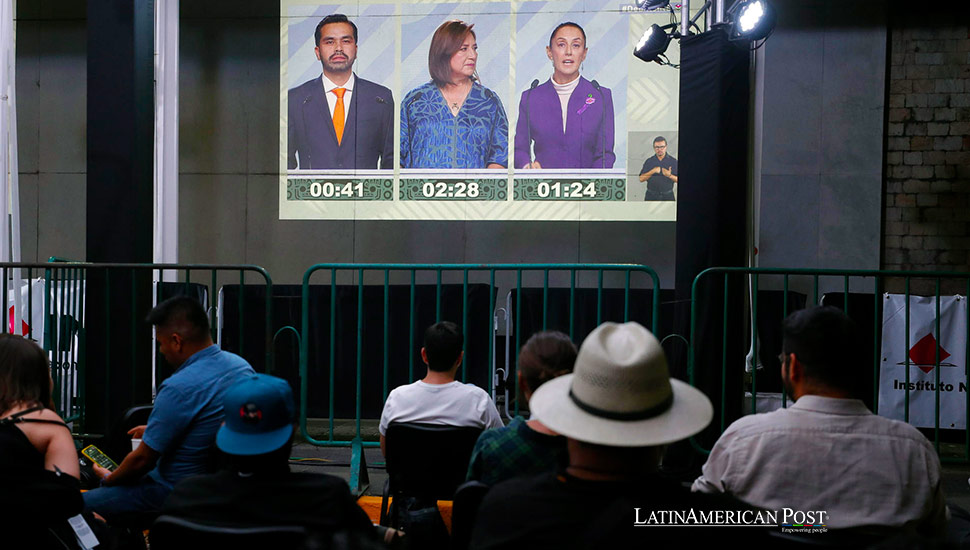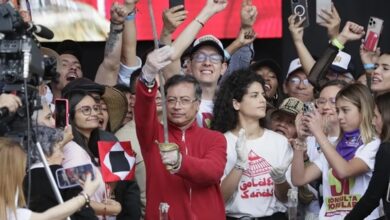Sheinbaum and Galvez Clash Over Security in Final Mexican Presidential Debate

In a critical debate, Mexico’s presidential candidates, Claudia Sheinbaum and Xochitl Galvez, sparred over security policies and crime rates. Both women vie for the presidency, promising distinct paths forward in a nation grappling with violence.
In a lively and intense debate on Sunday night, Mexico’s major presidential candidates, Claudia Sheinbaum and Xochitl Galvez, clashed over the country’s pressing security issues. The discussion, held just two weeks before the June 2 election, highlighted the starkly different approaches of the candidates, both of whom are vying to become Mexico’s first female president.
Claudia Sheinbaum, the former mayor of Mexico City and candidate of the ruling leftist Morena party, defended President Andres Manuel Lopez Obrador’s (AMLO) non-confrontational security policies. Sheinbaum emphasized her administration’s achievements in reducing crime in Mexico City through increased policing and social programs to address the root causes of crime. “I’m the only one who can show results in security,” Sheinbaum declared, citing a decrease in the murder rate during her tenure as mayor.
In stark contrast, Xochitl Galvez, a senator representing a coalition of left-right parties, fiercely criticized Sheinbaum’s record and the ruling party’s handling of security. Galvez accused Sheinbaum of misrepresenting her achievements, arguing that the number of murders in Mexico City rose due to the high number of deaths with undisclosed causes. She criticized the Morena party for its alleged ties to criminals, referencing AMLO’s 2019 encounter with the mother of notorious drug lord Joaquin “El Chapo” Guzman. “The country is on fire because you all have with criminals,” Galvez charged.
Historical Context: Mexico’s Security Challenges
Mexico’s struggle with violent crime, particularly related to powerful drug cartels, has been a significant issue for decades. The country has witnessed a surge in homicides and other violent crimes, exacerbated by the drug trade and corruption. Historical policies have oscillated between aggressive military crackdowns and more nuanced approaches that include social interventions.
President AMLO’s tenure has been marked by his “hugs, not bullets” policy, which focuses on addressing social issues rather than confronting criminal organizations. Critics argue that this approach has been ineffective, leading to record levels of violence. Supporters, however, believe it addresses the deeper socio-economic factors fueling crime.
During the debate, Sheinbaum and Galvez’s exchanges were particularly heated. Sheinbaum maintained that her administration’s strategies had led to tangible improvements in security, pointing to the recruitment of more police officers and investment in community programs. She framed her approach as a continuation of AMLO’s policies but strongly emphasized proven results.
On the other hand, Galvez used visual aids, including a graphic of Sheinbaum with a Pinocchio-style nose, to underscore her accusations of deceit. She emphasized the need for a more robust response to crime, including confronting drug cartels more aggressively and ensuring accountability within the government.
The Broader Political Landscape
This election is crucial for Mexico, as it represents a potential shift in the political dynamics that have dominated the country. Claudia Sheinbaum’s campaign is closely aligned with AMLO’s vision, promising continuity in the transformative social programs and economic policies initiated by the Morena administration. Her background as a scientist and her tenure as mayor position her as a candidate focused on pragmatic solutions grounded in empirical evidence.
Xochitl Galvez represents a coalition seeking to restore what they view as lost stability and security. Her business background and experience as a senator bring a different perspective to the political arena, emphasizing economic growth, job creation, and a more assertive stance on security.
The third candidate, Jorge Alvarez Maynez from the centrist Citizen Movement party, offered a different approach during the debate. At 38 years old, Maynez focused on youth and education, advocating for increased funding for higher education and opposing the criminalization of abortion and recreational marijuana. While his chances are slim, his presence adds another dimension to the political discourse.
Latin American Context
Mexico’s security challenges are not unique; they are part of a broader pattern observed across Latin America. Many countries in the region face similar issues with drug-related violence, corruption, and socio-economic disparities. Historically, responses to these problems have varied, with some nations adopting hardline approaches and others focusing on social reforms.
Countries like Colombia have experienced success in reducing violence through peace agreements and social programs, while others continue to struggle with high crime rates. The outcomes of Mexico’s policies could provide valuable lessons for the region, influencing how neighboring countries address their security challenges.
Public opinion in Mexico is deeply divided. Polls suggest that Sheinbaum maintains a significant lead, with a survey by Consulta Mitofsky showing her double-digit ahead. However, the political climate is volatile, and voter sentiment can shift rapidly in response to debates and emerging issues.
For many Mexicans, the key issues are security, economic stability, and the integrity of democratic institutions. The election’s outcome will hinge on which candidate voters believe can effectively address these concerns.
The Role of Gender in the Election
This election is historic not only because of the critical issues at stake but also because it guarantees that Mexico will elect its first female president. Both Sheinbaum and Galvez have acknowledged the significance of this milestone, framing their campaigns around themes of empowerment and change.
Women’s participation in Latin American politics has increased, with notable leaders like Brazil’s Dilma Rousseff and Argentina’s Cristina Fernandez de Kirchner paving the way. The election of a female president in Mexico would be a significant step forward for gender equality in the region.
As Mexico prepares for its presidential election, the debate between Claudia Sheinbaum and Xochitl Galvez has highlighted the stark differences in their visions for the country’s future. Sheinbaum promises continuity and proven results in security through social programs and increased policing. In contrast, Galvez advocates a more aggressive approach to tackling crime and corruption.
The election’s outcome will have profound implications for Mexico and the broader Latin American region. As voters head to the polls, they will decide between two distinct paths: one of continuity focusing on social reform and another promising a tougher stance on crime and law enforcement.
Also read: BYD Marks Its Entry into Mexico with the SHARK Pickup Launch
Regardless of the result, this election marks a significant moment in Mexico’s history, reflecting the evolving political landscape and the growing role of women in leadership positions. The world watches closely as Mexico stands on the brink of potential transformation, hopeful for a future marked by peace, prosperity, and greater democratic integrity.




